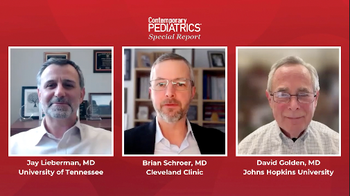
Weekly review: High BMI recommendations, mental health professionals in schools, and more
Get caught up with our journal! Review some of the top stories from the Contemporary Pediatrics website over the last week, and catch up on anything you may have missed.
Thank you for visiting the Contemporary Pediatrics® website. Take a look at some of our top stories from last week (Monday, June 17, to Friday, June 21, 2024), and click on each link to read and watch anything you may have missed.
1.) USPSTF recommends intensive behavioral interventions for children with high BMI
The US Preventive Services Task Force (USPSTF) recommends that clinicians refer children and adolescents aged 6 years and older with a high body mass index (BMI) to comprehensive, intensive behavioral interventions. This recommendation, graded "B", indicates a moderate net benefit. Approximately 19.7% of children and adolescents in the US have a BMI at or above the 95th percentile, with the rate of increase nearly doubling during the COVID-19 pandemic.
The USPSTF reviewed behavioral interventions, emphasizing at least 26 contact hours per year, including supervised physical activity and behavioral change methods. Pharmacotherapy was also reviewed, but the evidence was insufficient for long-term use.
2.) Survey: Most parents believe schools should have a mental health professional
A survey by Action for Healthy Kids and the CDC Foundation of 1016 parents and caregivers of K-12 public school children found that nearly 80% believe schools should employ mental health professionals. Conducted in December 2023, the survey aimed to understand parents' views on safe school environments and the role of schools in providing mental health support. Nearly two-thirds of parents desire training to better understand their child's mental health, and 70% feel their child is safer with a trusted adult present at school.
The American Academy of Pediatrics notes that schools are key providers of mental health services, with 1 in 5 children having an emotional, mental, or behavioral disorder, and over 75% of treated children receiving care at school. Survey results indicate that the biggest obstacle to children receiving mental health help is their own belief that they don't need it.
Additionally, parents express significant concerns about their children's physical safety, particularly the potential for weapons in schools.
3.) Treatment candidate for limp-girdle muscular dystrophy receives Rare Pediatric Designation
BridgeBio Pharma's BBP-418, a treatment for limb-girdle muscular dystrophy type 2I/R9 (LGMD2I/R9), has received Rare Pediatric Disease Designation. LGMD2I/R9 is a genetic disorder caused by mutations in the FKRP gene, initially affecting skeletal muscles and later progressing to respiratory and cardiac involvement. Symptoms typically begin in late childhood, leading to significant muscle weakness and potential reliance on assisted ventilation and cardiomyopathy in adulthood.
BridgeBio's phase 3 FORTIFY study (NCT05775848) has met its enrollment target, with topline data expected in 2025. This double-blind, placebo-controlled study evaluates BBP-418’s safety and efficacy, with interim results focused on glycosylated alpha-dystroglycan (αDG) as a surrogate endpoint.
4.) Screening for and treating the metatarsus adductus foot deformity
In a video interview, orthopedic surgeon Izak Daizade, MD, discussed metatarsus adductus (MTA), a congenital foot deformity where the front half of the foot angles sharply inward. Daizade emphasized the importance of early screening and treatment, introducing the Universal Neonatal Foot Orthosis (UNFO) brace as a non-invasive treatment option for MTA in newborns. The UNFO brace, a pre-molded corrective shoe with Velcro straps, eliminates the need for casting or surgical procedures, making treatment more accessible and convenient.
A 2022 study in the Journal of Pediatric Orthopaedics B found that the UNFO brace was as effective as standard casting in treating MTA but with shorter treatment duration and reduced social burden. Another study in the European Journal of Pediatrics in 2021 supported these findings, showing significant improvement in most patients using the UNFO brace.
Daizade highlighted the ease of use and effectiveness of the UNFO therapy, stressing its benefits over traditional methods.
5.) Children with Medicaid and persistent asthma face large specialty care disparity
A recent study in JAMA Network Open indicates that children with public insurance receive less specialist care compared to those with private insurance, which may lead to disparities in asthma outcomes. The study, led by Kimberley H. Geissler, PhD, from the University of Massachusetts Chan Medical School-Baystate, found the largest disparity among children with persistent asthma, a common chronic condition that can cause significant morbidity, especially in low-income families.
The cross-sectional study used data from the Massachusetts All Payer Claims Database from 2014 to 2020, including children aged 2 to 17 years.
Trending articles on Contemporary Pediatrics:
New roflumilast cream 0.15% data demonstrate improvements in AD symptoms at 56 weeks
Once-daily, steroid-free, topical roflumilast cream 0.15% has a PDUFA date of July 7, 2024.
Adolescent GLP-1 prescriptions increased 6-fold from 2020 to 2023
Drugs like semaglutide and liraglutide were dispensed at unprecedented increased rates for adolescents and young adults over a span of just 4 years.
Newsletter
Access practical, evidence-based guidance to support better care for our youngest patients. Join our email list for the latest clinical updates.



